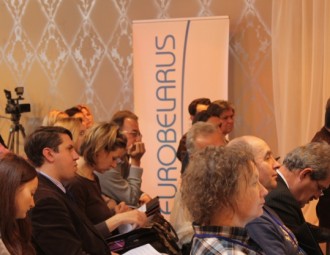Andrei Yahorau: "EuroBelarus" is able to mobilize civil society to address Belarus’ problems

The new Head of Board of the organization is ready to fight for the further politicization of "EuroBelarus" and the Belarusian National Platform of the EaP Civil Society Forum.
On June 13, during the general meeting of the International Consortium "EuroBelarus" Andrei Yahorau was elected to be the new Head of Board of the Consortium. He replaced Uladzimir Matskevich, who had been holding the position since 2011.
They say a new broom sweeps clean. Will the new Head of Board of “EuroBelarus” modify the strategy and tactics of the Consortium?
Andrei Yahorau told about his plans to the “EuroBelarus“ Information Service.
- "EuroBelarus" is an important organization in Belarus, one of the leaders that define the strategic course and civil society development objectives.
On the other hand, "EuroBelarus" provides significant support to the initiatives inside the sector that are focused on systemic changes in higher education, cultural heritage, in the work with people with disabilities. "EuroBelarus" brings together major leaders of civil society organizations in Belarus and is part of its elite.
- Are you going to modify tactics and strategy of the "EuroBelarus’" work?
- "EuroBelarus" should become more transparent and clear organization with the forms of work traditional for European NGOs: annual reports, transparency of financial flows, etc. Since "EuroBelarus" is registered in Lithuania, it must demonstrate openness, but to the degree that won’t harm the interests of partners inside Belarus. Regulation of work and increasing the transparency of the organization is one of the key problems today.
The second objective of "EuroBelarus" is the generation of ideas, innovations, and solutions for the Belarusian government and civil society in Belarus. It is obvious that the country has faced a crisis of ideas, personnel, and decisions in almost all spheres of life. We could mobilize the available resources of civil society to carry out real changes, contributing to the improvement of quality of life, promotion of reforms, more modern forms of governing organizations in socio-economic and political life in Belarus.
"EuroBelarus" is a concentration of a large amount of knowledge, ideas, programs and specific individuals related to knowledge. Now civil society has no normal communication with the authorities, though there are some signs of the "third sector" possible involvement in the dialogue with the authorities. But as long as we only see the signs, the two sides are just observing each other.
Today "EuroBelarus" is ready to offer not only its own resources, but is also able to mobilize a large part of civil society and human resources to address the problems in the country. At this stage, we could start a joint discussion of topical issues with the authorities.
- As one of the leaders of civil society, “EuroBelarus” Consortium has been actively participating in the Belarusian-European dialogue...
- We are engaged in the Belarusian-European dialogue. "EuroBelarus" is an active participant of the Belarusian National Platform of the Eastern Partnership Civil Society Forum and Ulad Vialichka, Director General of the International Consortium “EuroBelarus” is a co-chair of the Steering Committee of the Forum – it is through these mechanisms that we are included in the system of bilateral relations. We are very happy for the National Platform to get the invitation to participate in a strategic EU-Belarus Coordination Group, the first meeting of which was held this April in Brussels, while the next is scheduled for November in Minsk. A member of the Coordinating Committee of the National Platform Ulad Vialichka was representing the whole Belarus’ civil society in the course of these negotiations. Therefore, we look forward to further communication with the Belarusian authorities in the form of a strategic group.
- Do you intend to achieve bigger politicization of "EuroBelarus" and the National Platform?
- Over the last years Uladzimir Matskevich and me developed somewhat different visions idea of what should be done in the National platform. Now the stance of "EuroBelarus" in relation to the National Platform is the following: we will promote its development as far as possible and we believe that the National Platform is a legitimate space for the manifestation of the consolidated voice of civil society in Belarus-EU relations.
At the same time, we keep criticizing the National Platform for not being strong enough in fulfilling its functions and tasks. First of all, the tasks of consolidating and coordinating civil society for changing the general conditions of the sector in Belarus, including the issues of political transformations. The level of politicization of the National Platform remains insufficient for us ("EuroBelarus" had been previously accused of politicization of the National Platform).
We understand that within the frames of the National Platform we haven’t yet managed to reach a consensus among its members regarding the greater political role of the National Platform. But we will fight for it.
-
03.01
-
07.10
-
22.09
-
17.08
-
12.08
-
30.09



























